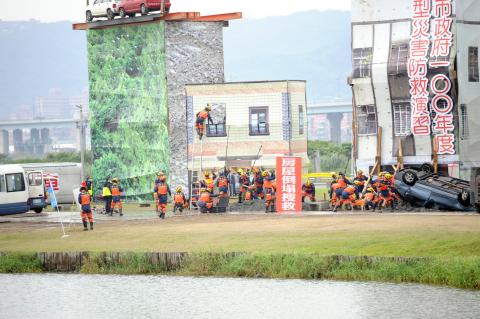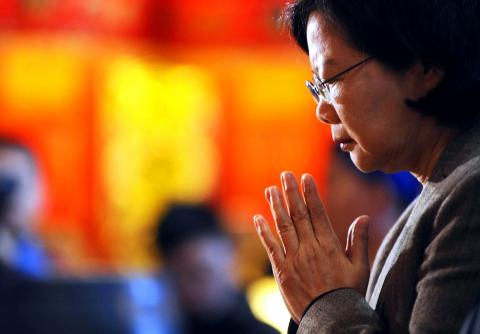Democratic Progressive Party (DPP) lawmakers yesterday rallied to presidential hopeful Tsai Ing-wen’s (蔡英文) defense after the Chinese Nationalist Party (KMT) attacked her plan to seek to draw down operations at the Fourth Nuclear Power Plant in Gongliao District (貢寮), New Taipei City (新北市), in favor of sustainable energy and other sources.
On Thursday, Tsai said if she were elected next year, she would seek to end operations at the power plant currently under construction as part of her plan to phase out nuclear energy by 2025. She also proposed decommissioning the three operational nuclear power plants between 2019 and 2025.
The shutdowns, she said, would be subject to conditions, including whether Taiwan could adequately replace the electricity produced by the plants with other power sources, such as by building renewable energy capacity and achieving better efficiency at coal-fired power plants.

Photo: Lo Pei-der, Taipei Times
At a hastily assembled press conference yesterday, Tsai said a report in the Chinese-language United Daily News had misrepresented her intentions, a key factor behind the KMT’s criticism, aides said.
“The United Daily News purposefully misrepresented [my comments],” Tsai said, adding that her plan was to spark discussion to ensure that operations at the plant do not start against the public’s wishes. The NT$273.5 billion (US$9.28 billion) project would still be completed, she said.
“Society should begin to examine now whether we should begin operations at the Fourth Nuclear Power Plant,” she said, adding that most opinion polls showed support for her approach.

Photo: CNA
In its attack, the KMT said Tsai should explain why she was promising to phase out nuclear energy when she failed to oppose the construction of the Fourth Nuclear Power Plant when the DPP was in power.
KMT Culture and Communication Commission Chairman Su Jun-pin (蘇俊賓) accused Tsai of manipulating the nuclear issue for political purposes and urged the DPP to discuss nuclear security with the KMT.
Su said former president Chen Shui-bian (陳水扁) and his administration should be blamed for delaying the project, only to approve the construction later, adding that the halt in construction could cost the nation more money.
“Tsai’s decision would have a negative impact on the nation’s energy security without a comprehensive plan. The KMT welcomes all political parties to discuss the issue and find a solution. Offering nothing but a slogan is not helpful,” he said.
Su also accused Tsai of failing to oppose a DPP government decision on the establishment of Kuokuang Petrochemical Technology Co in 2006 when she was vice premier and he urged Tsai to explain her “flip-flopping” on the issue.
At the legislature yesterday, DPP lawmakers said the decision on whether to terminate the construction of the Fourth Nuclear Power Plant should be submitted to the public in a referendum before next year’s presidential election.
DPP Legislator Gao Jyh-peng (高志鵬) said he expects preparations for the vote to begin next week.
“The nuclear problems in Japan should be an instigator for us to reopen the topic of nuclear safety in Taiwan. We should not continue to be mired in endless political slogans,” Gao said.
Concern over the domestic nuclear industry includes safety design issues, geographical conditions, the age of the three active nuclear power plants and a lack of monitoring and surveillance, DPP lawmakers said.
In addition, the Fourth Nuclear Power Plant has been beset by delays and cost overruns — some arising from a one-year moratorium on construction imposed by the Chen administration in 2000.
A proposal to find alternatives to the industry was valid, DPP Legislator Chen Ting-fei (陳亭妃) said.
The KMT criticism of Tsai was “extremely improper,” as what she intended was to spark public debate, she said.
Meanwhile, Premier Wu Den-yih (吳敦義) said “nuclear security” was the government’s main responsibility, while declining to give a timetable to phase out the nation’s nuclear power plants.
Wu’s remarks were a deviation from the nation’s statutory policy stipulated in 2002’s Environmental Basic Law (環境基本法), which states that a nuclear-free homeland is a strategic objective.
“The government is obligated to ensure nuclear security, but that does not necessarily mean a nuclear-free homeland,” Wu told KMT Legislator Chi Kuo-tung (紀國棟) during a question-and-answer session at the legislature.
Chi asked Wu to declare a timetable to realize the goal of a nuclear-free nation, saying the KMT’s “vague attitude” on the subject could put it in an unfavorable position during the upcoming elections, while the DPP’s presidential hopefuls have responded positively to rising antinuclear sentiment following the incidents in Japan.
Aside from Tsai, former premier Su Tseng-chang (蘇貞昌) has also said that a nuclear-free homeland is his goal, though he has not committed to any timetable.
Disagreeing with Chi that the KMT could be battered in the polls over the nuclear energy issue, Wu said Tsai’s statement on ending operations at the Fourth Nuclear Power Plant was not supported by the public or by Su Tseng-chang.
“Polls show that in the early stages of the Fukushima [Dai-ichi] nuclear crisis, only 30 percent were in favor of launching operations at the Fourth Nuclear Power Plant, with 60 percent opposed. When told that NT$200 billion had already been spent on construction and that it could only operate under the precondition of security, 60 percent supported the plant and only 27 percent opposed it,” Wu said.
Wu said that Tsai’s plan to leave the Fourth Nuclear Power Plant idle after construction if she was elected was reminiscent of the suspension of the project by the former DPP administration, which he said led to a stock market crash and set back economic growth.
“Who made the decision to scrap the project, which dealt a deep blow to the country, and who then decided to resume construction? The pain remains fresh in people’s minds,” Wu said.
Wu said the KMT’s position to continue developing nuclear energy was clear.
“Under circumstances in which nuclear power plants operate safely, the Executive Yuan supports generating an appropriate proportion of the country’s energy from nuclear power,” Wu said.
At a separate setting, Huang Hsien-chang (黃憲章), vice chairman of state-owned Taiwan Power Co (Taipower), which operates the nation’s nuclear power plants, called Tsai’s objective of achieving a nuclear-free nation by 2025 “unrealistic.”
Taiwan relies on imports for 99 percent of its energy needs, with 75 percent generated by fossil fuels and 20 percent by nuclear power plants, Huang said.
In view of the high proportion of electricity produced by nuclear power, the cost and time needed for coal-fired power plants to be built and difficulties getting the plants to pass environmental impact reviews, “it’s nearly impossible to replace nuclear energy with other energies by 2025,” Huang said.
Taipower has installed 162 onshore wind turbines over the past decade, almost the nation’s maximum capacity, Huang said, adding that space for offshore wind turbines was limited.
If nuclear energy is to be replaced by wind power, the main source of the country’s renewable energy, the country needs to install a total of 12,000 wind turbines, Huang said.

SECURITY: As China is ‘reshaping’ Hong Kong’s population, Taiwan must raise the eligibility threshold for applications from Hong Kongers, Chiu Chui-cheng said When Hong Kong and Macau citizens apply for residency in Taiwan, it would be under a new category that includes a “national security observation period,” Mainland Affairs Council (MAC) Minister Chiu Chui-cheng (邱垂正) said yesterday. President William Lai (賴清德) on March 13 announced 17 strategies to counter China’s aggression toward Taiwan, including incorporating national security considerations into the review process for residency applications from Hong Kong and Macau citizens. The situation in Hong Kong is constantly changing, Chiu said to media yesterday on the sidelines of the Taipei Technology Run hosted by the Taipei Neihu Technology Park Development Association. With

A US Marine Corps regiment equipped with Naval Strike Missiles (NSM) is set to participate in the upcoming Balikatan 25 exercise in the Luzon Strait, marking the system’s first-ever deployment in the Philippines. US and Philippine officials have separately confirmed that the Navy Marine Expeditionary Ship Interdiction System (NMESIS) — the mobile launch platform for the Naval Strike Missile — would take part in the joint exercise. The missiles are being deployed to “a strategic first island chain chokepoint” in the waters between Taiwan proper and the Philippines, US-based Naval News reported. “The Luzon Strait and Bashi Channel represent a critical access

‘FORM OF PROTEST’: The German Institute Taipei said it was ‘shocked’ to see Nazi symbolism used in connection with political aims as it condemned the incident Sung Chien-liang (宋建樑), who led efforts to recall Democratic Progressive Party (DPP) Legislator Lee Kun-cheng (李坤城), was released on bail of NT$80,000 yesterday amid an outcry over a Nazi armband he wore to questioning the night before. Sung arrived at the New Taipei City District Prosecutors’ Office for questioning in a recall petition forgery case on Tuesday night wearing a red armband bearing a swastika, carrying a copy of Adolf Hitler’s Mein Kampf and giving a Nazi salute. Sung left the building at 1:15am without the armband and apparently covering the book with a coat. This is a serious international scandal and Chinese

COUNTERINTELLIGENCE TRAINING: The ministry said 87.5 percent of the apprehended Chinese agents were reported by service members they tried to lure into becoming spies Taiwanese organized crime, illegal money lenders, temples and civic groups are complicit in Beijing’s infiltration of the armed forces, the Ministry of National Defense (MND) said in a report yesterday. Retired service members who had been turned to Beijing’s cause mainly relied on those channels to infiltrate the Taiwanese military, according to the report to be submitted to lawmakers ahead of tomorrow’s hearing on Chinese espionage in the military. Chinese intelligence typically used blackmail, Internet-based communications, bribery or debts to loan sharks to leverage active service personnel to do its bidding, it said. China’s main goals are to collect intelligence, and develop a